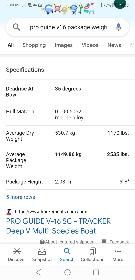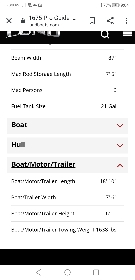bobbo268
New member
So unfortunately I have a small suv with a 1500 lb tow capacity. I was looking at a 2006 Pro Guide v16 and I'm trying to get the towing weight. Every place I look gives me a bunch of different weights, and I'm never sure if that includes the motor and I know it doesn't include a trailer. One place said the dry weight was 675, I know that means empty and I'm doubting that includes the motor.
Are my expectations too high with this size of boat? I was originally going to go order a 2022 waverunner this month but my interests have turned for the time being so I'm trying to see what I am able to do with a small vehicle. Thank you in advance
And yes, I'm new here and if all goes as planned I'll eventually be old here
Are my expectations too high with this size of boat? I was originally going to go order a 2022 waverunner this month but my interests have turned for the time being so I'm trying to see what I am able to do with a small vehicle. Thank you in advance
And yes, I'm new here and if all goes as planned I'll eventually be old here



